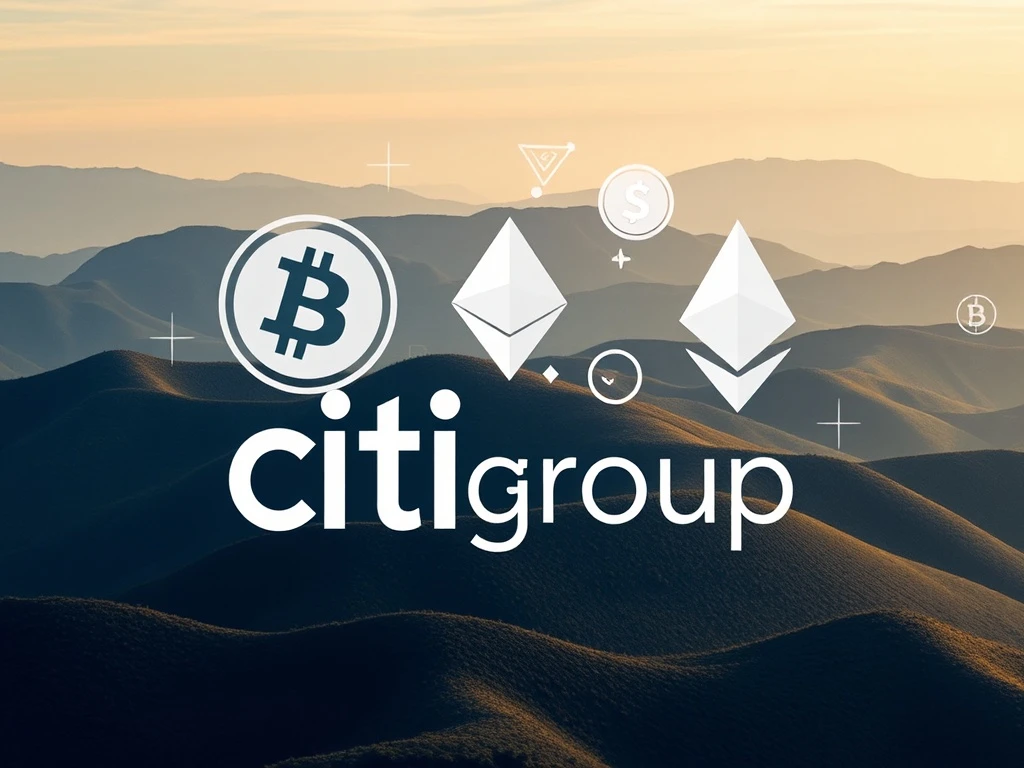Citigroup Unlocks Crypto Custody: Billions Flow into ETFs & Stablecoins

A monumental shift is underway in traditional finance. Wall Street titan Citigroup is actively exploring Citigroup crypto custody and payment services. This move signals a profound acceleration of institutional engagement with digital assets. The bank aims to capitalize on surging market interest in cryptocurrencies. It also leverages a more favorable regulatory environment. This development holds significant implications for the broader crypto ecosystem.
Citigroup’s Strategic Move into Crypto Custody
Citigroup’s exploration into cryptocurrency custody and payment services marks a strategic pivot. The financial giant recognizes the escalating demand for digital asset solutions. Biswarup Chatterjee, a key executive within Citigroup’s services division, confirmed these plans. His team manages treasury, payments, and cash management for large corporations. Chatterjee highlighted the bank’s initial focus on custody services. These services would support ‘high-quality assets backing stablecoins.’ This approach minimizes immediate risk while addressing a growing market need.
Furthermore, Citi is examining custody offerings for crypto-linked exchange-traded products. This includes popular Bitcoin ETFs and Ether ETFs. Chatterjee stated, ‘There needs to be custody of the equivalent amount of digital currency to support these ETFs.’ This necessity underscores the critical role custody plays in the burgeoning ETF market. Citi’s move demonstrates a clear response to evolving market dynamics. It also positions the bank at the forefront of digital asset integration within traditional finance.
The Remarkable Growth of Crypto ETFs
The landscape for crypto ETFs has transformed dramatically. Bitcoin ETFs, launched in early 2024, quickly gained immense popularity. These investment vehicles provide traditional investors with regulated access to digital assets. According to Bitbo, the 12 US spot Bitcoin ETF issuers now hold nearly 1.3 million BTC. This represents about 6.2% of Bitcoin’s total circulating supply. BlackRock’s iShares Bitcoin Trust (IBIT) leads the pack. Its estimated market value stands around $88 billion.
Inflows into US spot Bitcoin ETFs have surged alongside Bitcoin’s price rally. This indicates strong investor confidence and demand. While starting slower, Ether ETFs also experienced a significant surge in inflows. BlackRock’s Ethereum fund became the third-fastest in history to reach $10 billion in assets. This rapid growth validates the institutional appetite for diverse crypto exposure. Citigroup’s move to offer custody for these products directly supports this expanding market. It provides essential infrastructure for continued growth.
Stablecoins: A Cornerstone for Bank Adoption
Citigroup’s particular interest in stablecoin-backed assets highlights their growing importance. Stablecoins are digital currencies pegged to stable assets like the US dollar. They offer price stability, unlike volatile cryptocurrencies. This characteristic makes them attractive for traditional financial operations. Banks view stablecoins as a bridge between conventional finance and the digital asset world. They facilitate efficient cross-border payments and treasury management. Their stable nature reduces risk for institutional clients.
Citigroup’s focus on ‘high-quality assets backing stablecoins’ emphasizes a cautious, yet strategic entry. This approach ensures regulatory compliance and asset security. Furthermore, a stablecoin focus aligns with broader industry trends. Many financial institutions are exploring tokenized assets and digital payment rails. This includes the possibility of issuing joint stablecoins among major banks. This collective interest underscores stablecoins’ potential to revolutionize financial infrastructure. They offer a reliable and efficient medium for digital transactions.
Citigroup’s Expanding Blockchain Footprint
Citigroup’s current exploration of custody and payment services is not its first venture into crypto. The bank has steadily built its presence in the blockchain space. Earlier this year, Citi partnered with Switzerland’s SIX Digital Exchange. This collaboration leveraged blockchain technology. Its aim was to improve private markets through asset tokenization. Citi has eyed tokenization as a ‘killer use case’ since at least 2023. They estimated this market could reach a $5 trillion valuation by 2030. This foresight demonstrates Citi’s long-term vision for digital assets.
Citi’s prior engagements include:
- Partnership with SIX Digital Exchange: Leveraging blockchain for private markets.
- Tokenization initiatives: Identifying it as a significant future market.
- Joint stablecoin exploration: Discussing potential issuance with other major banks.
- Active institutional investment: Ranking among top investors in blockchain companies (18 deals, 2020-2024).
These consistent investments underscore Citi’s deep commitment to blockchain innovation. They position the bank as a key player in the evolving digital asset landscape.
Navigating the Regulatory Landscape
Traditional financial institutions, including Citigroup, have found encouragement in recent regulatory developments. Trump-era efforts have aimed to provide greater clarity for the crypto sector. These initiatives extend to the US Securities and Exchange Commission (SEC). The SEC’s shifting stance on crypto ETFs is a prime example. The recent passage of the US GENIUS Act, a key stablecoin law, further bolsters confidence. In July, the House of Representatives passed several significant bills. These included the CLARITY market structure bill. They also passed the Anti-CBDC Surveillance State Act.
These legislative actions signal a growing governmental recognition of digital assets. They aim to establish a clearer framework for their integration into the financial system. Such regulatory advancements reduce uncertainty for major banks. They pave the way for broader institutional adoption of cryptocurrencies and blockchain technology. This evolving landscape empowers banks like Citi to expand their digital asset offerings with greater assurance. It fosters a more predictable environment for financial innovation.
The Future of Institutional Digital Assets
Citigroup’s strategic move into Citigroup crypto custody and payment services represents a significant milestone. It highlights the accelerating convergence of traditional finance and digital assets. The increasing demand for Bitcoin ETFs and Ether ETFs, alongside the growing utility of stablecoins, drives this integration. Major banks are no longer just observing the crypto space. They are actively shaping its future through direct participation and investment. This trend suggests a future where digital assets are seamlessly integrated into mainstream financial services.
Custody solutions are crucial for this evolution. They provide the security and regulatory compliance institutions require. As regulatory frameworks continue to mature, more financial giants will likely follow Citi’s lead. This ongoing institutional adoption will further legitimize and stabilize the cryptocurrency market. It promises a new era of financial innovation and accessibility. The shift signifies a profound transformation in how global finance operates.









